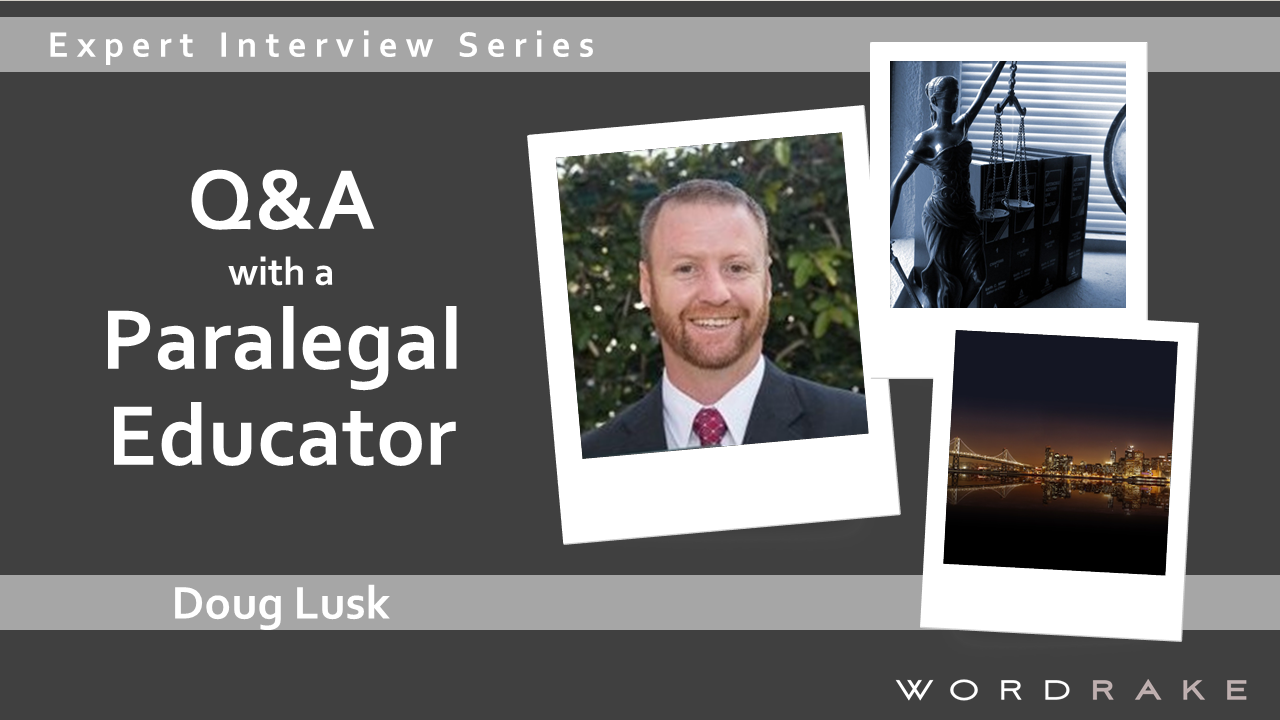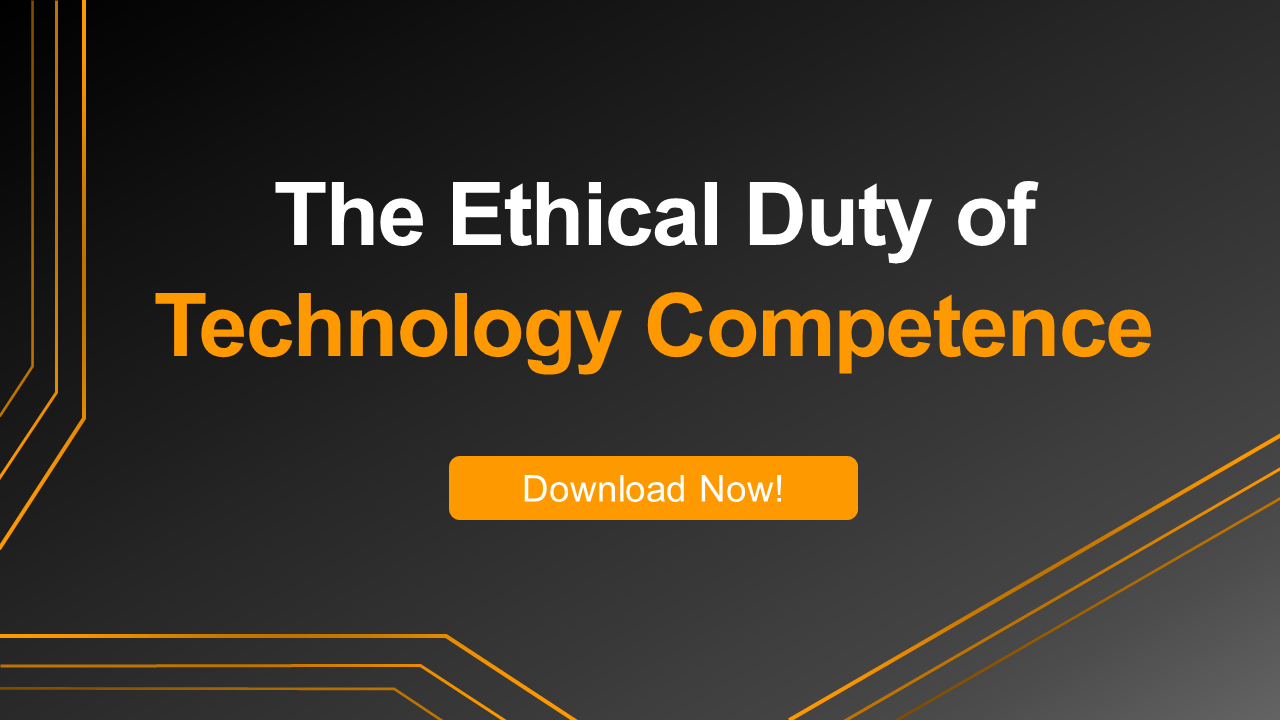The most efficient legal service team combines the complementary strengths of its members. While lawyers may understand the “why” of the work, paralegals understand the “how.” And, together, they meet client needs.
As part of their training, paralegals learn to use legal technology, including shortcuts, best practices, and superuser tricks that it would take most lawyers years to learn once they enter practice. Paralegals also learn to quickly and effectively build the container that lawyers will use to deliver their legal advice—this usually takes the form of a document. With a highly skilled paralegal, legal teams can do great work at a great value.
These are the skills that paralegals will learn when they take a class from formally trained lawyer and adjunct professor of paralegal studies Doug Lusk. Learn more about paralegal training in this interview with Doug as he discusses the skills and specialized training that paralegals bring to a law firm. Read on to learn why paralegals are a key part of the legal service team.
What is your role and how did you get to where you are today?
I am the President and CEO at National Society for Legal Technology (NSLT). I founded the NSLT at the end of my 1L year in law school as a student organization. Law schools were not teaching any classes or doing anything to promote legal technology competence, and I needed to do something about that! Having worked in a law firm as a paralegal before law school, I knew technology was a huge part of practicing law.
The NSLT quickly grew and spread to other schools across the nation. Within a year, schools incorporated the NSLT’s technology lessons into the classroom curriculum. By the time I graduated law school, almost 100 universities were using the NSLT lessons. Now, the NSLT Legal Technology Certificate program is required curriculum in over 220 paralegal schools and law schools across the United States and Canada.
After graduating from law school, I received an offer to become an adjunct professor at Fullerton College to teach Law Office Technology in their paralegal program. I also teach at Salt Lake Community College, Mt. San Antonio College, Daemen College, and University of California – Berkeley Extension. I teach five 3-credit classes each semester and love every minute of it!
What inspired you to teach paralegals?
Paralegals are the ones using technology to its fullest extent. Law Office Technology has been a required course by most paralegal programs for the last 10 to 15 years. In contrast, less than 10% of law schools offer a technology class. If they do, it is an elective and not a required class. So naturally, being a legal technology enthusiast, teaching at a paralegal program was a good fit as it puts me on the front line of schools that are making the biggest impact on legal technology education.
Why do you think formal paralegal training is important?
A paralegal is not a glorified secretary. You must have a degree or a certificate to be a paralegal, without it, you are just a legal assistant. Paralegals are highly skilled, trained legal professionals. Formal training for a paralegal is just as important as formal training for a lawyer. Why would you want to put your life (or your financial well-being) in the hands of someone who is not formally trained to deal with that situation?
Where can paralegals make the most difference in legal practice?
I tell my students that technology is their chance to shine in a law office. It is the one subject they learn in school not covered by any class taken by the lawyer they work for. No paralegal can start a job fresh out of school, walk into the office, and teach the lawyer something new about torts or contracts—but it happens all the time with technology!
How can technology help in paralegal work?
Technology brings efficiency. It is common across the industry for a paralegal to be assigned to assist multiple lawyers. In the firm I worked for, we had one paralegal for every four lawyers. Paralegals need to be quick and efficient to support that many (usually needy and demanding) lawyers. Technology allows paralegals to keep up with the demand. We learn to work smarter, not harder!
Do paralegals have a duty of technology competence?
Absolutely! ABA Model Rule 1.1 focuses on the duty of competence for lawyers, noting “A lawyer shall provide competent representation to a client. Competent representation requires the legal knowledge, skill, thoroughness, and preparation reasonably necessary for the representation.” Comment 8 to that rule points out that “To maintain the requisite knowledge and skill, a lawyer should keep abreast of changes in the law and its practice, including the benefits and risks associated with relevant technology…" (emphasis added). That obligation extends to paralegals and support professionals working with licensed lawyers. Technology competence is an ethical issue. It is not ethical for a paralegal to bill eight hours for something that would be a five-minute task had they implemented the correct technology.
What document creation tasks are most efficiently and effectively done by paralegals?
Every document should start at the paralegal’s desk and then move to the lawyer to polish the argument and perfect the strategy before returning to the paralegal to clean up and prepare for filing and service. You are not efficiently using your law firm’s resources (and you’re potentially overbilling your clients) if the lawyers are doing all of their own document creation. Lawyers are trained in “why” a task is done; paralegals are trained in “how” a task done. Why bill your clients at the lawyer rate for a task that can/should be completed by a paralegal?
What are the ethics, rules, and standards that govern paralegal work?
Paralegals are governed by the same rules that govern lawyers. The professional rules of conduct affect the lawyer and everyone working under her. If the lawyer has the duty, the paralegal and support staff have the same duty. The only difference is the paralegal does not have a state-issued license to lose, but they will quickly find themselves unemployable if they do something that causes their lawyer to lose their license!
How would you like to see the role of paralegals change in the next 10 years?
Why wait ten years?! The future for paralegals is happening now! Several states have limited licensing or commissioned positions that give allied professionals without law degrees the authority to perform legal services in limited areas. Many other states are exploring the idea of limited licensed professionals representing underserved communities in family law, landlord–tenant and contract agreements, and administrative law areas. For now, Washington State has Limited Licensed Legal Technicians, Utah has Limited Paralegal Practitioners, and Arizona has Certified Legal Document Preparers. Most of these new licensing areas start with training as a paralegal and expand into a few law school courses (it is like being a “super paralegal”).
About Doug Lusk
Doug Lusk is a formally trained lawyer and adjunct professor at Fullerton College, teaching Law Office Technology in their paralegal program. He is a nationally recognized expert in legal technology education and has been a keynote speaker at various bar association and tech conferences across the nation.
Doug is also the founder and CEO of National Society for Legal Technology (NSLT). By 2021, the NSLT’s Legal Technology Certificate was classroom curriculum in over 225 universities and colleges in the U.S. and Canada and had independent members in 11 countries around the world. In January of 2020, the NSLT partnered with the Association of Certified Electronic Discovery Specialists (ACEDS) to bring about the industry’s first practical skills-based certification. The eDiscovery Technology Certificate (eDTech) program is quickly revolutionizing how eDiscovery is taught in law schools and paralegal programs across the nation.
About the Paralegal Interview Series
This interview is part of a collection of interviews about paralegal work. By producing this series, we hope to shine a light on some of the most important but often undervalued people in law: paralegals. Paralegals are key contributors to a high-value legal practice and are more effective when they’re empowered. Let’s start working better together.
Nearly everyone working in a law firm writes, and that writing must be done well. WordRake can help produce better, clearer documents in less time. WordRake is clear and concise editing software designed for people who work with confidential information. The software improves writing by simplifying and clarifying text, cutting legalese, and recommending plain English replacements. WordRake runs in Microsoft Word and Outlook, and its suggestions appear in the familiar track-changes style. Learn more about our paralegal program and our 2-week enterprise pilot. Or try an individual license of WordRake for free for 7 days.







